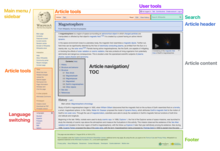Läsning/Webb/Stationära förbättringar
|
Stationära förbättringar
En serie nya funktioner och omplaceringar i Vector-utseendet
|
Det tidigare förvalda Wikimedia-utseendet (Vector) rullades ut 2010. Över det kommande årtiondet berikades gränssnittet med tillägg, finesser och användarskript. De flesta av vilka inte samordnats visuellt eller över flera wikier. Samtidigt har webbdesign samt förväntningar från läsare och användare förändrats. Det var dags att ta några av de här idéerna och föra de till standardupplevelsen för alla användare, på alla wikier, på ett organiserat och standardiserat sätt.
Between 2019 and 2023, we were building a new skin. Vårt mål är att göra Wikimedias wikier mer välkomnande och öka användbarheten för läsare och bibehålla användbarheten för befintliga användare. Vi har mätt det ökande förtroendet och positiva känslan gentemot våra webbplatser och våra webbplatsers användbarhet (det att använda vanliga funktioner som att söka och byta språk).
In 2022, the new skin became ready to be the default. Since then, we are introducing it on more and more wikis. Ultimately, we need to have one skin as the default everywhere. This is because keeping two as the default indefinitely is impossible.
Uppdateringar
Vad var vårt mål?
Föreställ dig en garderob
-
Vi vill gradvis förvandla detta...
-
...till detta :)
Det tidigare gränssnittet...
...levde inte upp till förväntningarna. ...var plottrigt och ointuitivt. ...uppmärksammade inte gemenskapen. ...var inte konsekvent med mobilversionen.

- Det stationära gränssnittet levde inte upp till förväntningarna från moderna webbplattformar. Den upplevdes som desorienterande och disharmonisk. Navigering och gränssnittslänkar organiserades hursomhelst.
- Readers were unable to understand the purpose, terminology, and concepts of available tools such as the main menu, user menu, and page tools.
- Editors found the hierarchy of the navigation to be confusing for newcomers.
- Editors and other contributors wanted easier access to tools they used frequently.
- Editors expressed interest in having fewer, but more prominent, ways to begin contributing.
- Det fanns plotter som distraherade användarna från att fokusera på det de kom för. Det är utmanande för läsare att fokusera på innehållet. Man kunde inte på ett intuitivt sätt byta språk, söka efter innehåll eller byta inställningar. Nya användare kunde inte intuitivt skapa ett konto, redigera eller lära sig att använda icke-artikelsidor för att moderera.
- Too much information density and navigational elements on the page made it difficult to focus on a particular reading or editing task.
- Readers found it difficult to navigate the page and spent a lot of time scrolling.
- Readers found it difficult to search for information that is relevant to them.
- Multilingual readers were not aware of language switching functionality.
- Readers wanted to have an easy way to view the table of contents throughout the page.
- Character count per line was more than three times the recommended value.
- En väldigt liten del av läsarna förstod hur Wikimedias wikier fungerade. Många läsare var inte medvetna om att innehållet de läste skrevs av volontärer och uppdaterades frekvent eller att de själva kunde delta.
- Den stora skillnaden i upplevelsen mellan vårt stationära gränssnitt, våra appar och mobilwebben gjorde det svårt läsare att knyta an till våra produkter. Det saknades enhetlighet i konceptet på Wikimedias wikier.
Hur ändringarna görs
Principer
Vi rör inte innehållet. Vi rör inte andra utseenden än Vector. Vi tar inte bort funktionaliteter. Vi gör inga större ändringar i enklare steg.
- Vi arbetar bara på gränssnittet. Inget arbete utförs i form av att utforma mallar, struktur hos sidors innehåll, kartstöd eller mallar mellan wikier.
- Utseenden förutom Vector är utanför ramen för våra justeringar. Vi har fryst Vector till Legacy Vector och börjat rulla ut våra funktioner som delar av den nya standard Vector.
- Element i gränssnittet har flyttats runt men alla navigeringsobjekt och annan funktionalitet som tidigare fanns tillgänglig som standard stannade kvar.
- Trots att våra ändringar lätt syns försökte vi ha en evolutionär inställning och ville att webbplatsen ska fortsätta kännas bekant för läsare och användare. Alla funktioner har diskuterats, utvecklats och rullats ut var för sig.
Process for developing the features
- 2019: Problem identification research with both readers and editors – We studied the way people used the site. We identified the largest usability issues as well as obstacles in becoming more engaged with reading or editing. We did this by interviewing readers and editors across multiple countries and locations. We also surveyed gadgets and user scripts. Some of them deserved to be surfaced and be a part of default experience. (See the links: Research and design: Phase 1, Research and design: Phase 2.)
- 2019–2022: Prototype development and testing – We built out the ideas for features and began showing prototypes. Each feature was tested with readers and editors through interviews and on-wiki prototype testing. We used Central Notice banners across multiple languages and Wikimedia projects. Each prototype was tested by approximately 200 editors on average. (Example)
- 2020–2023: Refining and building – We refined or changed the features based on the outcomes of the prototype testing. In some cases, we asked for additional opinions to ensure we were making the right decisions.
- 2020–2023: A/B testing and other quantitative testing on wikis – This was the "beta" phase:
- We performed tests for whether the features worked as expected based on the previously defined criteria of success. We made "before and after" comparisons or performed A/B tests. As the latter, we gave a new feature to 50% of users and compared them to the other 50%. After two weeks we compared the results.
- If we received negative results, we identified the reasons across different audiences and made changes to the feature. Then, we would test the feature again. In the case of significantly negative results, we rolled back our changes. (Example)
- Vi testade våra förbättringar i samarbete med diverse frivilliga "tidiga antagande" wikier, både Wikipediaversioner och systerprojekt.
- We also monitor usage across all wikis, where many account holders have been already using the new skin.
- 2022 – onwards: Deployments on more and more wikis – The results of testing and subsequent analysis concluded that our changes result in improved usage of the skin, and save time previously spent in scrolling, searching, and navigating. We interpret this as an easier and more comfortable reading experience. There are no negative effects to pageviews, account creation, or edit rates. Knowing this, we continue to roll out the skin on more and more wikis.
Vilka funktioner som lagts till
Utrullningsplan och tidslinje
Utseendet kan nu bli standard på alla wikier.
| minskande antal wikier | växande antal wikier |
|---|---|
| användare eller läsare ser som standard inte våra ändringar |
användare och läsare ser som standard våra ändringar |
| bara användare kan välja det (från inställningarna, genom att bocka i Vector (2022) i fliken Utseende) |
bara användaren kan väja bort det (med hjälp av Byt till gamla utseendet i sidfältet, eller direkt från sina inställningar) |
| Year | Month | Deployments |
|---|---|---|
| 2019 | maj | First team discussions |
| 2020 | juli/augusti | The new logo, collapsible sidebar, and limited content width introduced on the first early adopter (pilot) wikis, including French Wikipedia |
| september | The new search widget is introduced | |
| 2021 | juni | The new language switching is introduced |
| februari | Deployments on more pilot wikis, including Bengali, Korean, and Portuguese Wikipedias | |
| 2022 | augusti | The new user menu is introduced |
| januari | The new sticky header is introduced Deployments on more pilot wikis, including Indonesian, Thai, and Vietnamese Wikipedias | |
| februari | The changes are separated out from the Vector legacy code to a new skin "Vector 2022" | |
| maj | The new table of contents is introduced | |
| juni | The skin is introduced on the last pilot wikis, including Catalan and Japanese Wikipedias The first visual refinements are introduced | |
| oktober | Deployments on the smallest Wikipedias | |
| november | The new full/limited-width toggle button is introduced | |
| december | Deployments on Arabic and Greek Wikipedias | |
| 2023 | januari | Deployment on English Wikipedia |
| februari | The full/limited width preference becomes persistent for logged-out users | |
| mars | The new page tools menu is introduced | |
| april | Deployment on Polish Wikipedia | |
| maj | Deployment on Spanish Wikipedia | |
| augusti | Deployment on Chinese (zh) and several smaller Wikipedias | |
| oktober | Deployments on Swedish, Hungarian, Dutch, Hindi, Norwegian bokmål Wikipedias Also on Meta-Wiki and most Wikibooks, Wikinews, Wikiquotes and Wikiversity wikis | |
| november | Deployments on most Wikivoyages and Wiktionaries The last visual refinements (known as Zebra 9) are introduced | |
| 2024 | mars | Deployments on most Wikisources and Foundation internal wikis |
Engagera dig & kontakt
- Testa individuellt: I inställningarna, bocka i alternativet Vector (2022). Du kan också aktivera våra ändringar med hjälp av globala inställningar.
- Främja: informera din gemenskap. Dela våra uppdateringar och blogginlägg.
- Rapportera fel: För att rapportera ett fel, skapa ett ärende på Phabricator och lägg till #Desktop Improvements Vector 2022-projekt.
- Översätt: hjälp oss översätta relaterade sidor:






